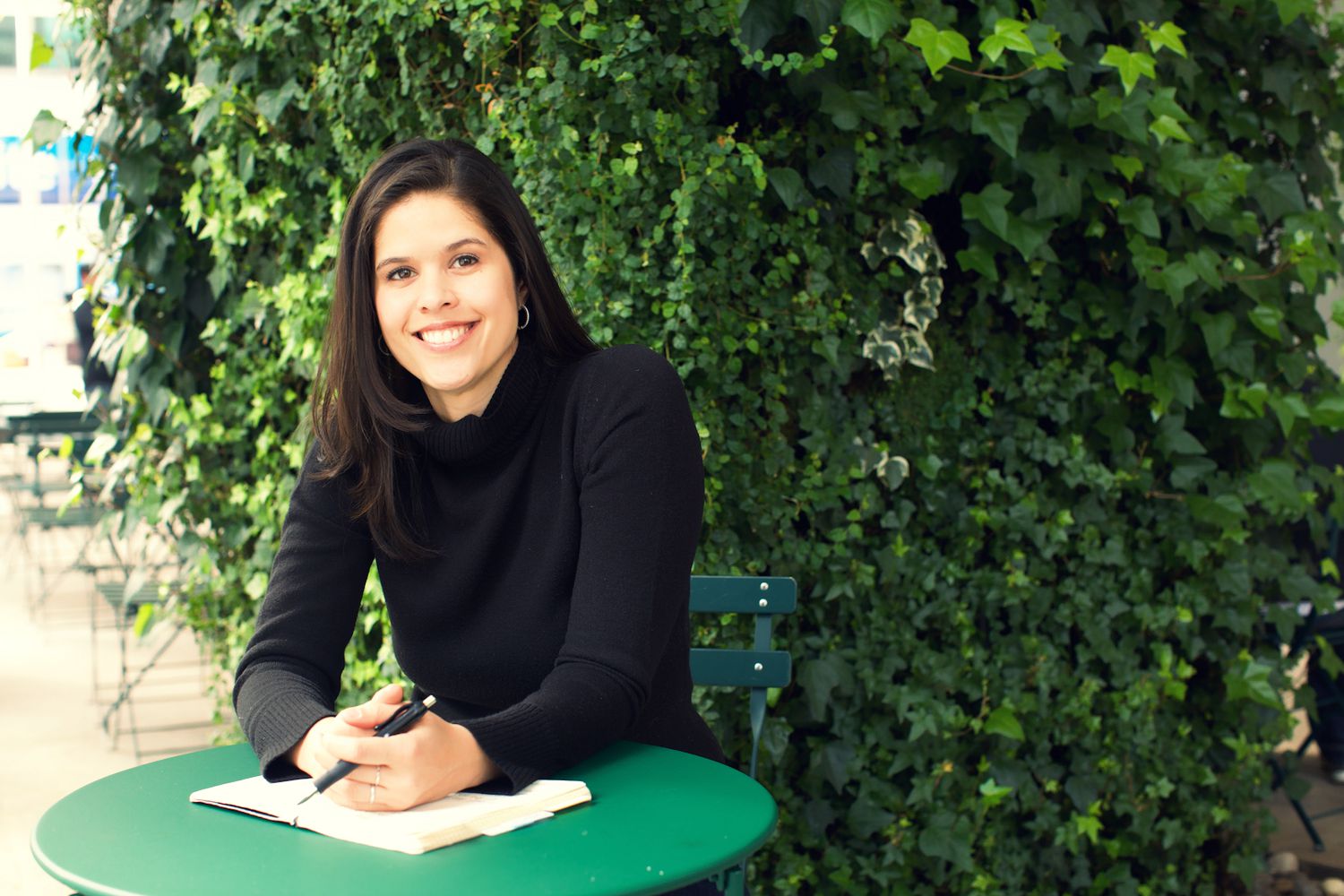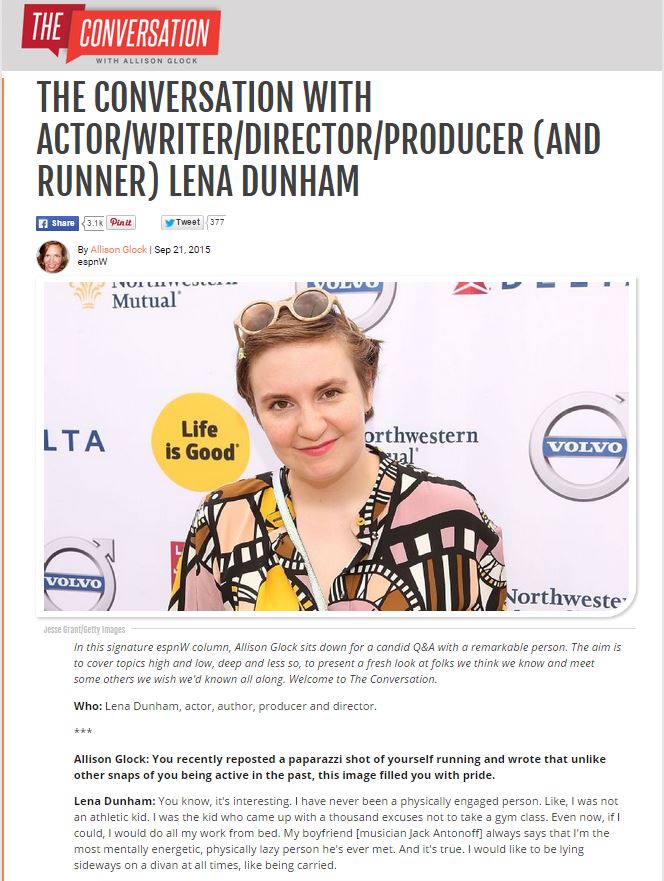
espnW’s Editor-in-Chief, Alison Overholt
WHEN YOU THINK OF ESPN, the stereotypes it conjures are of men, beer, and bro-ing out over sports, right? But it’s 2015, and female interest in sports coverage has been around for decades! So why the perpetual focus on guys? That’s where Alison Overholt and espnW come in. Overholt took over as espnW’s Editor-in-Chief in 2014, after having worked at ESPN earlier in her career. Overholt has also put in time at Fast Company, and has contributed to The Wall Street Journal, O: The Oprah Magazine, Cosmopolitan, and Sports Illustrated: Women and Fitness, among many others. The New York native is in charge of developing content for all platforms of espnW, and she spoke to Lady Clever about curating a digital sports space for women, her thoughts on the body shaming of female athletes, and why sports are not just for men.
What was your biggest goal for espnW when you became Editor-in-Chief?
I’m going to answer your questions about biggest goal and biggest challenge together, because they truly are the one and the same. And that’s to give our team the permission to be ambitious. Really ambitious. I want my team to know in their hearts that espnW stories are not created to supplement pieces from other groups, that we are not offering coverage that’s merely additive. espnW can and will originate significant, conversation-starting, noteworthy storytelling, and commentary for the sports world. We’ve already started to deliver on that, whether it was offering up the most thought-provoking commentary around the NFL’s domestic violence crisis a year ago, addressing mental health in young athletes through an emotional longform package about the death of UPenn track star Madison Holleran last spring, or being the only outlet to land a lengthy, all-access profile of Hope Solo on the eve of the Women’s World Cup.
That ambitious mindset is so important, not only because it enables us to produce the best individual pieces, but also because it signifies to our audience and to our industry that placing women at the center of our coverage — as subjects and as storytellers — matters.
 Why is it important for women to have their own digital space when it comes to sports?
Why is it important for women to have their own digital space when it comes to sports?
First, it telegraphs that women are important: as an audience, as central characters in sports stories, and as storytellers themselves. It’s all well and good to say that the media should embrace parity in their coverage of female athletes, women’s sports, and women as influencers across the sports landscape – but you can’t simply flip a switch and see that happen overnight. By creating a dedicated space for women in sports, we shine a spotlight and remind people daily that a focus on women matters.
Second, it’s an open door, a community that embraces women in the sports conversation. I’m not suggesting that women need to be coddled in any way, or that we’re somehow not capable of having higher-level sports conversations in other spaces — but the fact that the internet is not only unfriendly to women but can be a downright vicious place for women to engage in conversation and debate is a well-documented phenomenon.
Having a dedicated digital space that explicitly welcomes women and celebrates our conversation around the sports we love is very important. espnW is the place where women can exhale and not be on guard every single online second. Then we can put our anti-troll armor back on and dive back in to all those other digital spaces knowing that no, we’re not crazy, and no, we don’t have to make anyone a sandwich, thank you very much, and yes, we can talk about our favorite teams, immerse in the stories of great athletes, and debate the issues of the day any time we’d like.
Aside from focusing on women with espnW, do you ever feel any pressure to gear stories in a more “feminine” direction, or take a human interest angle, if you’re not publishing content about events or scores?
It’s interesting that you frame ‘human interest angles’ as being inherently more feminine. Take a look at all great stories – they are always about something more than an event or a score. It’s what draws people to the best sports journalism, the best journalism period: When a story is about the person behind the score, when it seeks to understand a greater truth about the human experience, told through the prism of sports and the athlete experience, that’s when a story resonates and stays with us long after the final words on the screen. Do I feel pressure to reach that standard? Every single day.
 Do you feel the need to promote a healthy body image for female readers and athletes, especially when you take the recent body shaming of female athletes like Serena Williams into account?
Do you feel the need to promote a healthy body image for female readers and athletes, especially when you take the recent body shaming of female athletes like Serena Williams into account?
So much of this is about education. When there are too few stories about women in general, we literally don’t have the opportunity to see women who display a whole range of healthy, strong body types, and the public defaults to whatever narrow vision of beauty and body image that’s provided. Body shaming athletes is ridiculous. Look at what they are able to do with their bodies! Look at what they have worked so hard to accomplish. The more people learn about that, and get to see what sports and athleticism bring to our lives, the more these outdated ideas about body image will just fall away.
How do you balance your creative and business duties? Does one side tend to overtake the other?
Oh, that’s a great question – I don’t think anyone’s ever asked me that before. When I was running 183Ink, the effort to strike that balance was a constant balancing act. I loved the business strategy challenge of it, but every so often I’d start to feel like I was drying up creatively, and I’d pitch a bunch of stories and just immerse and write for awhile. At espnW, that pendulum swing happens more fluidly, according to what’s happening in our world and what needs more attention at any given moment. It’s one of the things I love about the job: being so closely connected with crafting our creative, storytelling approach, but also being involved with figuring out how to grow our business.
If you could give one piece of advice to women looking to break into the business world, what would it be?
Dream big. Bigger than you think you should. Because we all have the right to do that.
Keep up with Alison and check out her website. You can also connect with her on Facebook, Twitter, and LinkedIn. To get smart, interesting content about the sports world, check out espnW and stay up-to-date with them on Facebook, Twitter, and Instagram.
















